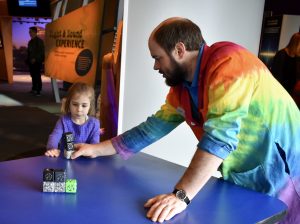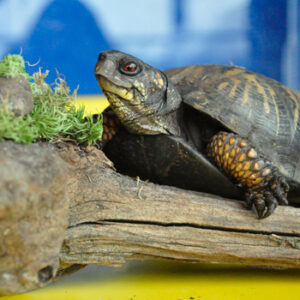So our five senses are touch, sight, smell, sound and taste. We use our senses every day, but how good are your senses? Andrew and Nate are here to show you some simple games you can try with your family and friends at home to test your senses. Let’s get started!
Materials to Collect
Sound Game:
- An even number of small, opaque containers
- Small objects, (beans, buttons, thumbtacks, erasers, etc.)
Scent Game:
- Essential oils, scented candles, perfumes, or food
- Blindfolds
Try it!
Sound Game:
- Set up the game by filling the opaque containers with small objects. There should be two containers half full of each object, (e.g. two containers of buttons, two containers of beans, two containers of thumbtacks). Make sure all of your containers are filled to the same amount – you don’t want one container half-full and one only a quarter full.
- Challenge your family or friends to try to find the matching objects just by shaking the containers by listening to the sounds.
- Remember: no peeking until you are ready to check your answers
Scent Game:
- Either drop essential oils onto cotton balls, or grab some scented candles, perfume, or food and blindfold your game contestant.
- Challenge your family or friends to identify the smells without using their other senses. (This is where the blindfold comes in. The contestant will need to be blindfolded if you are using something that they could identify with their eyes).
- If they are struggling to identify the smell, give them 4-5 options of what it could be and see if that makes it any easier.
What is the Science?
Our senses almost always work together to help us experience our world and stay safe. Honing in on one sense can make a seemingly easy task, like telling the difference between beans and buttons, suddenly much more difficult. Even though objects like beans and buttons look very different and taste very different (don’t eat buttons), they are both small and hard. This means that when you are shaking them in a container and relying on your sense of hearing, they can be hard to tell apart.
Studies have shown that humans can differentiate between 1 trillion different smells! Humans can have incredibly rich ‘smell histories’ in their memory. When you are asked to identify a smell with no other context, your brain is trying to match that smell against every other smell you have identified before. This can be really tough! It becomes a lot easier when you have options to choose between. Sometimes it can be hard to name a smell specifically, but it can remind you of a particular time or feeling. Our sense of smell is deeply tied to our emotion and memory.
Ask Your Young Scientists
- Which sounds are really easy to figure out? Which ones are harder? Why do you think some are harder to figure out than others?
- Can you think of other objects that would be hard to tell apart from each other just using the sound?
- Can you think of some smells you smell all the time? Do you think it would be easier or harder to figure out these smells if they were part of the game?
- Pick a smell you know really well. Can you describe it to me without telling me what the smell is from? Do you think I can guess it?
- Was it easier to identify the smell if you were given some choices?
More to Explore
Try different objects or smells in your hearing and scent games. Try a game where a blindfolded friend has to hold their nose and try to identify Lifesaver or Starburst flavors without their sense of smell. You might be surprised to find out how much some of our senses rely on some others!
You can also create a similar game using your sense of touch. Blindfold your contestant and have them try to identify objects using just their sense of touch.
Try a touch game by putting different grits of sandpaper in order from smooth to rough while blindfolded.
Put different items from around the house (or outside) in a box and have someone try to guess what it is just by touching it.
For more senses activities, check out these sites:
https://www.notimeforflashcards.com/2010/07/feel-and-touch-city-craft.html
https://www.familyeducation.com/fun/science-activities/using-your-senses-game
https://kidshealth.org/en/kids/experiment-main.htm
If you are interested in your sense of smell, check out this Ted Talk:
We want to see what you try at home. Share your experiments with us on social media by using the #ScienceAtPlay and tagging @CTScienceCenter.

Andrew Fotta is a STEM educator at the Connecticut Science Center. He has currently holds a CT teaching certification for grades K-6, and has spent time in the classroom in nearly all grades, and taught middle school science. In addition to teaching classes for the Science Center, Andrew is also part of a team of educators currently creating new programs aligned with the new Next Generation Science Standards for grades PreK-9. Andrew is an avid photographer, who enjoys blending science and art in his work.




